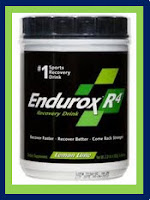 For short runs, drinking just water after the run is fine, but for endurance runs, it's important to replace lost electrolytes after the run. On runs more than an hour, you need to be sure not only to kick in some fluids with electrolytes during the run, but you need to be sure and replace them after the run too. Not replacing the lost electrolytes can lead to an electrolyte deficit leading into the next run and that's not a good thing. So what are electrolytes? Electrolytes are macronutrients the body uses to keep the body systems working properly. Runners often hear about two electrolytes (sodium and potassium) but there are actually five electrolytes.
For short runs, drinking just water after the run is fine, but for endurance runs, it's important to replace lost electrolytes after the run. On runs more than an hour, you need to be sure not only to kick in some fluids with electrolytes during the run, but you need to be sure and replace them after the run too. Not replacing the lost electrolytes can lead to an electrolyte deficit leading into the next run and that's not a good thing. So what are electrolytes? Electrolytes are macronutrients the body uses to keep the body systems working properly. Runners often hear about two electrolytes (sodium and potassium) but there are actually five electrolytes.
The "BIG FIVE":
- Sodium is important because it carries the water molecule throughout the body. without sodium, you'll become dehydrated very quickly, even if you're drinking water. Ever been on a run and had a sloshy stomach? If you just drank a bottle of water, it's probably just what you just drank sloshing around, but if you drank earlier in the run and you still have that sloshing around happening in the stomach, chances are your sodium stores are low. You can have a stomach full of water, but if there isn't proper levels of sodium in the body, there's no way for it to get out of the stomach to the rest of your body.
- Calcium is needed for muscle contraction, nerve function, and strong bones
- Magnesium like Calcium is needed for muscle contraction, nerve function, and strong bones
- Potassium is needed to relax a contracted muscle. Low levels of Potassium can lead to muscle cramps. Potassium also supports heart function and helps keep blood pressure regulated.
- Chloride is needed to maintain fluid balance, blood volume, and blood pressure
 Sports drinks are great for during the long run, but research has shown not only are dairy drinks (chocolate milk) great for post run rebuilding, they are also better at re-hydrating the body after a long run than sports drinks. Chocolate milk is a great post run recovery and rehydration drink. It contains the right mixture of carbs and protein and drinking it within 15-30 mins after your run is idea in helping your body recover and rebuild. Chocolate milk also contains sodium and calcium, two of your needed electrolytes.
Sports drinks are great for during the long run, but research has shown not only are dairy drinks (chocolate milk) great for post run rebuilding, they are also better at re-hydrating the body after a long run than sports drinks. Chocolate milk is a great post run recovery and rehydration drink. It contains the right mixture of carbs and protein and drinking it within 15-30 mins after your run is idea in helping your body recover and rebuild. Chocolate milk also contains sodium and calcium, two of your needed electrolytes.
It's a great idea to include electrolyte-rich foods in your daily diet as well as to eat post-run. Sports nutritionist Nancy Clark provides some great food suggestions below to help replenish your depleted electrolyte stores:
Sodium: chocolate milk, peanut butter, bagel, even soup! Also try some deli turkey!
Potassium: bananas, sweet potatoes, spinach, kale, peas, beans, avocado, and dried of fresh fruits like oranges, melons, raisins, prunes
Calcium: milk (regular or soy), cereal, yogurt, latte
Magnesium: leafy green veggies, whole grains, nuts, peanut butter, dried beans, lentils
Chloride: olives, rye, tomatoes, lettuce, celery
Smoothies are an easy way to get in your needed electrolytes. No need to drive to the smoothie shop either. Below are some great smoothie ideas from nutritionist, Laura Buxenbaum that are easy to make at home.
Running
Refuel Shake
1 cup fat-free chocolate
milk
1 scoop 100% whey protein
powder
Crushed ice
Triple
Berry Smoothie
1 cup low-fat vanilla
yogurt
1/3 cup frozen blueberries
1/3 cup frozen strawberries
1/3 cup frozen raspberries
Ice
Orange Peach
Mango Smoothie
1 cup orange juice
1 cup low-fat vanilla
yogurt
1/2 cup frozen unsweetened peaches
1/2 cup frozen mangoes
Ice
PB&B
Protein Smoothie
1 banana
1 tablespoon creamy peanut
butter
1 cup 1% milk
1 scoop plain, vanilla, or
chocolate whey protein powder
Crushed ice
Blues
Buster Smoothie*
1 (6-ounce) container
low-fat blueberry yogurt
1/2 cup apple juice
1/2 cup fresh or frozen blueberries
1/2 cup frozen sliced peaches
Crushed ice
*Recipe
from SoutheastDairy.org
One of my favorite smoothie creations is the "RunnerDude Pumpkin Smoothie."
RunnerDude's Pumpkin Smoothie*
1/2 cup pumpkin puree
1/2 cup fat-free vanilla Greek yogurt
1 banana, sliced into chunks (freezing the banana is beforehand is great too!)
1 teaspoon pumpkin pie spice
1/2 cup skim milk
1 teaspoon vanilla extract
1 cup ice
Note: for a thinner consistency, add another 1/2 cup skim milk. For extra sweetness, add 1 tablespoon honey.













